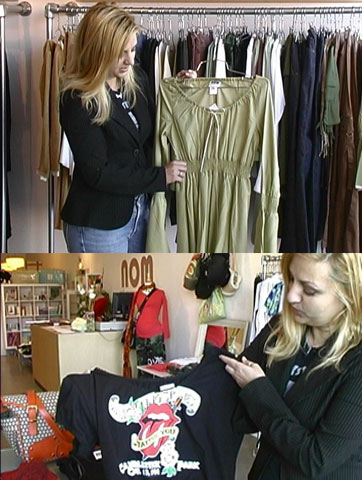Simply Single
Men & Women: The Ambiguity of Actions and the Saving Grace of Straightforwardness
Page 1
 It can happen during the most inopportune or most fitting of times, and it can strike anywhere. From buying lunch at a deli, browsing a supermarket isle, or busing it to work, to walking one’s dog, waiting at the doctor’s office, or working out at the gym, individuals evaluate one another. Depending on their single status or sometimes even lack thereof, gutsy guys and gals approach the apple of their eye, attempting to break the ice and achieve a friendly rapport with hopes it may lead to more. In addition to proactive pursuers, silent, shy, or secretive souls and conversation-starters who strike up small talk with anyone and everyone due to their outgoing, unassuming, friendly nature, coexist together. With most unable to read minds and figure out the romantic intent of most strangers, acquaintances, and even friends, many find it easier to let their wall down around those to whom they are not attracted or those of the sex to which they aren’t attracted, for it can often be easier to assume they are harmless and motiveless. Once unguarded, individuals feel more at ease with being themselves, comfortably chatting, contacting, cooking up plans, cracking jokes, and the like. Processing and perceiving interactions, situations, and events involving the sex(es) to which one is attracted individually and independently, one’s perceptions of what another is conveying influences and creates one’s sense of reality, which can lead to miscommunication. Considering individual complexities and perceptions, can one prevent another from misreading, misinterpreting, and mistaking platonic kindness and actions as something more? Are explanations and definitions needed to prevent such misunderstandings? Why can well spelled out actions and intentions still suffer some sort of ambiguity to which we are unaware?
It can happen during the most inopportune or most fitting of times, and it can strike anywhere. From buying lunch at a deli, browsing a supermarket isle, or busing it to work, to walking one’s dog, waiting at the doctor’s office, or working out at the gym, individuals evaluate one another. Depending on their single status or sometimes even lack thereof, gutsy guys and gals approach the apple of their eye, attempting to break the ice and achieve a friendly rapport with hopes it may lead to more. In addition to proactive pursuers, silent, shy, or secretive souls and conversation-starters who strike up small talk with anyone and everyone due to their outgoing, unassuming, friendly nature, coexist together. With most unable to read minds and figure out the romantic intent of most strangers, acquaintances, and even friends, many find it easier to let their wall down around those to whom they are not attracted or those of the sex to which they aren’t attracted, for it can often be easier to assume they are harmless and motiveless. Once unguarded, individuals feel more at ease with being themselves, comfortably chatting, contacting, cooking up plans, cracking jokes, and the like. Processing and perceiving interactions, situations, and events involving the sex(es) to which one is attracted individually and independently, one’s perceptions of what another is conveying influences and creates one’s sense of reality, which can lead to miscommunication. Considering individual complexities and perceptions, can one prevent another from misreading, misinterpreting, and mistaking platonic kindness and actions as something more? Are explanations and definitions needed to prevent such misunderstandings? Why can well spelled out actions and intentions still suffer some sort of ambiguity to which we are unaware?
From friendly, forward, or forthcoming to wary, wishy-washy, or withdrawn, individual psyches and personalities vary just as a candy store varies in a plethora of assortments. Despite the appearance or one’s opinion of any sugarcoated sweet, one often must taste or try a confection before coming to any real conclusion about it. Similarly, since appearances and assessments deceive in the dating world, one must interact with another to form a conclusion or an opinion about the person. Depending on one’s impression of another, he/she continues or cuts off communication with the person for various reasons. Working at the same firm, Alana and Josh quickly befriended one another. Outgoing and friendly, Alana felt comfortable talking about everything and anything, so long as the other person was just open-minded.
Warming quickly to Josh’s candid personality, they took regular smoke and lunch breaks together and shared serious, silly, and sordid stories on politics, life, and dating. Alana loved her rapport with Josh, relieved that they shared a perfect platonic relationship, unlike most men who often approached her with the intent towards or hopes for something more. She often though to herself, “This is great! Josh is a cool guy with whom I can talk and joke about anything. It’s nice to know there are guys out there who want to be a woman’s friend and nothing more.” About six months into their friendship, during a smoke break, Josh asked, “If you weren’t dating Mike, you’d date me, wouldn’t you?” Shocked and surprised by the unexpected question, Alana laughed. “No, I wouldn’t,” she chuckled, shaking her head in disbelief at the question. “You would, wouldn’t you? I think you would.” He earnestly offered. Hiding her discomfort, she smiled, calmly reiterating, “No, I wouldn’t, Josh. Seriously. Why?” From that moment on, their rapport changed from chummy companions to awkward acquaintances. Misinterpretation of their dynamics created two disparate views of Alana and Josh’s rapport. While Alana thought their friendship was completely platonic, Josh misconstrued the combination of her openness and their ritual breaks and lunches as a sign of potential interest. Alana wondered how Josh could have assumed there was more to their friendship. She had often openly talked about the man she dated, plainly pointed out Josh wasn’t her type, and consistently treated him like a buddy.
Dynamics between individuals, in which one or both could potentially be attracted, like any other type of relationship, can fall prey to subjective interpretation at all times. Frequently, communication between these individuals ends up much like a game of Telephone. Let’s say Marie meets Todd at a get together, and they immediately hit it off. As captivating conversations create an air of comfort around them, Marie feels Todd would make a fun friend and companion, since they seem to share much in common. In Todd’s mind, the chemistry confirms Marie’s budding interest for him. Both feel the other shares the same sentiment, and a “friendship” develops. Viewing his company as guaranteed good times, Marie calls to invite Todd to swanky soirees, cappuccinos at the coffeehouse, and movie matinees. To Todd, Marie’s increased invitations display her developing affections toward him. For instance, Marie would casually say, “Hey, what are you up to? Do you want to grab a cup of coffee?” Todd’s interpretation? Hi, Todd. I want to see you; do you want to grab a cup of coffee? With ever growing feelings, Todd began to obsess about Marie. As his feelings grew, he began obsessing about her, fabricating false illusions in his mind about the state of their “relationship.” Noticing a difference in his demeanor, Marie kept her distance to prevent any misunderstanding, causing Todd to become irritated by her change in behavior. Following a confrontation, during which Todd confessed his fervent feelings and Marie professed a purely platonic one, their “friendship” came to an end.
Comparable to the game of Telephone, messages transmitted from one to another lose some of their original meaning and become distorted by paraphrases. Add human nature into the equation, and the situation increases in complexity, for individuals subject words to various connotations, denotations, and interpretations; a recipient’s own interpretation or idea of the story or situation inevitably influences how a message is received and processed. At times failing to take things at face value, individuals attempt to read in between the lines in search for some sort of subtext, since all actions contain some level of intent. For instance, a good-natured woman smiling and chatting could be seen by another as a flirt. Similarly, a personable and honest man complimenting a young lady could be seen by the young lady as just a dirty pervert who wants to try to get into her pants. Moments, instances, conversations, and interactions can fall victim to individual interpretation; the perceived subtext affects the comprehension of any given incident, giving way to erroneous presumptions.
Perplexing and plentiful, individual personalities and psyches drive, direct, and dominate both sexes. Perhaps as a result of nature, nurture, or both, men and women often communicate, channel, and comprehend circumstances differently, though some prove not unlike each other in cognitive and behavioral processes. Throwing sex into the formula activates attachment in some and further complicates situations. With scads of character and ego variations to last us days to discover and discuss, let’s consider three types from both sexes to simplify things a bit. For the most part, a large majority of men operate as “hunters,” seeking out and having sex with women that range from acceptable to appealing. For such singles, friendliness and sociability come easily and often act as a means to an end; the energy exerted frequently serves to win over an individual with whom they want to hook up.
Comprised of those ranging from shy, sensitive, or self-conscious to skittish, solicitous, or schizo, wariness, fear, and/or baggage influence the second group of singles. Victims of past experiences, personal demons, or perceptions of oneself, this group of singles often branches out into two subgroups: the emotionally evasive and the emotionally addicted. For the emotionally evasive, the issues one endures lead one to build a wall protecting one’s emotions, using various forms of behavior, such as infidelity. On the other hand, often lacking luck or struggling a bit in the dating area, the emotionally addicted often fall susceptible to emotional commitment in most all types of relationships and interactions. Consequently, many experience premature attachment and/or different levels of obsession. From nice to neurotic, the emotionally addicted frequently fail to take rejection well and tend to turn a deaf ear to hints of disinterest, choosing instead to perpetually pursue the object of their affections. Finally, varying from charming or captivating to calculating or careful, some single men easily meet, attract, and date women, yet for reasons only they or their psyches can explain, like a bruised ego, the dynamics of a relationship shifts from one of detachment to one of attachment and/or obsession.
Just as there are a plethora of personality types for men, there exist plenty for women as well. Whether through nature or nurture, most women tend to nurture others in various ways, ranging from caring for others, chatting away, or conducting themselves nicely to consorting with others, considering another’s feelings, or creating a cozy atmosphere. Moreover, often raised in an environment that promotes verbal communication, many women possess a higher propensity towards sociability. As a result, when approached, most women fail to quickly ignore and reject conversation starters, politely engaging desirable and detesting conversations.
In addition to sympathetic socializers, there exist some women purely driven by sex. Similar to their male counterparts, these forward females usually suffer no emotional attachment. Scoping out and hooking up with men, they commonly disassociate sex with love, view sex as no big deal, fall short of getting attached through sex, and prove more apt to rejecting conversation starters that waste their time. Then, there remains a group which socializes to an extent, but contains a range of women, including the anti-social, shy, inexperienced, unlucky in dating, and insecure. Ordinarily lacking in wisdom attained from age, experience, or security, this group can mistake sex and kindness as more and can become attached quite easily, for attention, physical relationships, and the like provide validation they seek and need.
What happens when you throw the ample assortment of men and women into one pot? One gets room for mix-ups, misreads, and misjudgments leading to experiences of heartbreak, horror, or headache. Tall, slender, cute, and extremely personable, Erica garnered ample attention, yet nearly all relationships, mutual commitments and casual affairs ended shortly with former beaus headed for the hills. During each short-lived romance, Erica earnestly expressed belief that each suitor was “the one” and carried on as such. Suffering from insecurity issues––a home with an unloving father, and no desire to cultivate any intellect––her modus operandi consisted of flirting for attention, constant coddling, superficial conversations, over obsessing, and attempts at appealing as “perfect wife” material. In her mind, she believed the manner in which she was carrying on appealed to men and attracted those seeking a commitment. On the other hand, the objects of her affection often sought the momentary or decided she wasn’t serious material after a bit of dating, resulting in a clash of dialogue, spoken and unspoken. She lamented a beau’s complaint that they didn’t talk about much and his decision to “hang out” at her house for a mere hour or two before attending a get-together without her. I suggested she initiate and partake in conversations involving topics he’d find interesting, other than superficial, sans substance small talk. Afraid she would misunderstand my suggestion, I explained that engaging her beau in dialogue on topics relating to concerns exhibited her interest in his life and things pertaining to him. Furthermore, it would provide that extra “something” to keep him interested, for looks and the physical fade. Flustered, she snapped, “What do you mean? I don’t know what you mean by that.” Occupied with the outward and suffering vulnerabilities superficial, frivolous thoughts and concerns enveloped her world. Despite any well-meaning recommendations from friends, she mistook their advice as criticism and attacks on her character, stunting her from seeing the bigger picture and seeking self-growth. Instead, pleasing and immersing herself with the man in her life took precedence over all else; this in turn created fertile ground necessary in planting seeds of obsession and premature attachment.
For example, while dating Dave, Erica slept with him early on, believing that such intimacy confirmed his interest in wanting more than just the casual. Each act of kindness or moment of fun further underscored her belief that things were getting serious, and he was “the one.” To Dave, on the other hand, his actions meant nothing more than a manifestation of his feelings at that moment. Nice and fun loving, Dave treated almost everyone kindly and politely. Dating Erica proved no different; he treated her as he would anyone else, with the added detail that they slept together. In his eyes, it was what it was an nothing more, which conflicted with Erica’s notion that their relationship was headed towards seriousness. Due to her personality, past, and psyche, she couldn’t simply take things at face value, unnecessarily adding more worth to things only to set herself up for disappointment. As the relationship fizzled, Erica grew distraught and eventually heartbroken. Mistaking his actions as more, she blinded herself from seeing the true nature of the relationship, assumed he wanted more, and endured a painful letdown.
Breezing through the aisles at Ralphs, Allie maneuvered to make her shopping safari short. Spotting her in the produce section, Jake approached Allie, attempting to break the ice with his rendition of charm and wit. Possessing a pleasant, polite personality, Allie found it difficult to ignore strangers, sometimes even the scumbags. As he rambled on, she wanted badly to bolt, for she found him annoying, aggressive, and aesthetically unpleasing. Instead of doing so, she continued to listen, courteously conversing, with a strained smile. When Jake asked for her number, she quickly revealed she had a boyfriend; yet Jake remained relentless, attempting to hand his business card to her. In his mind, despite her non-single status, her receptiveness reinforced her potential interest in him. Trying hard not to publicly injure his ego, yet praying he would disappear, Allie graciously grabbed the business card he offered with hopes he would scurry away afterwards. He left on top of the world, assuming he held some chance with her. Cocky and confident, individuals like Jake cannot take subtle hints, for they truly think they are a desirable catch. In such instances, it proves prudent to muster up the nerve to say “NO,” since oddly enough, all else still stresses potential interest.
Faced with a multitude of multifarious individuals, one can prevent or reduce misunderstanding- based mishaps through clear, concise, candid communication. In the complex world of dating, speaking up serves to sever any semblance of attraction to or fascination with a person in whom you hold no interest. Seemingly difficult for some to be the bitchy, bad guy, the honesty can beget benefits, such as possibly establishing a clearer rapport, free from premature, unsubstantiated assumptions. Moreover, being blunt can help fend off the forward, frustrating types which one may unfortunately run into at random times and places. Consequently, curtly cutting off suitors that fail to tickle one’s fancy or that push to persuade one to feel differently can save one from distracting dilemmas and drama. Though some slightly insane types may appear hurt, they will surely recover from the setback sooner if the ties are cut earlier rather than later. So, before setting off, strap on your armor of straightforwardness. You may just find that it protects you from many preventable problems and perplexities.
Written by Patricia Lee
 I know this woman who can make you laugh so hard your sides will ache. I know this woman who can tell such a riveting story that you won’t want her to stop. I know this woman who swims every day, used to run just as diligently, never forgets a birthday or holiday, always has a smile on her face, but can still come up with those clever quips about the latest fashion, or what’s going on in the entertainment industry. This woman finds time to watch Tyra’s new show, while still going to her thrice-weekly dialysis treatments. This woman is someone I have known almost my entire life. She placed in several beauty pageants, twirled the baton in school, modeled professionally, and was even a Raiderette cheerleader.
I know this woman who can make you laugh so hard your sides will ache. I know this woman who can tell such a riveting story that you won’t want her to stop. I know this woman who swims every day, used to run just as diligently, never forgets a birthday or holiday, always has a smile on her face, but can still come up with those clever quips about the latest fashion, or what’s going on in the entertainment industry. This woman finds time to watch Tyra’s new show, while still going to her thrice-weekly dialysis treatments. This woman is someone I have known almost my entire life. She placed in several beauty pageants, twirled the baton in school, modeled professionally, and was even a Raiderette cheerleader.






